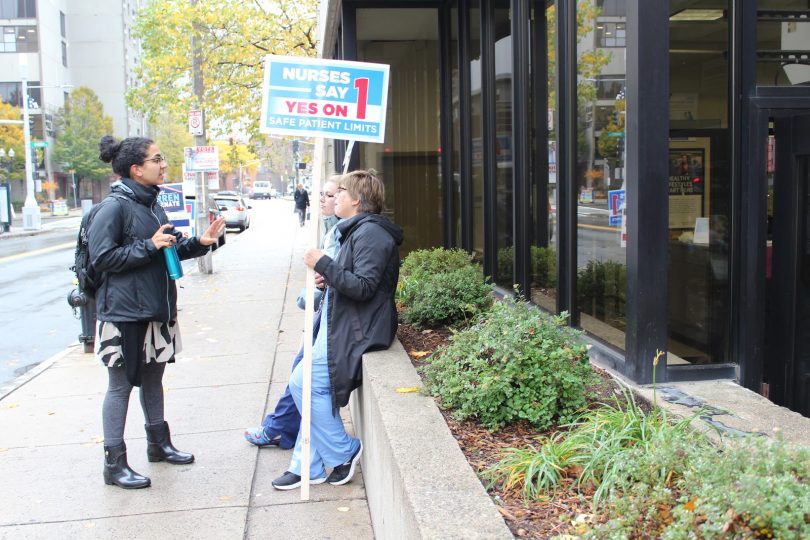By Emily Confalone and Sophia Lipp
BU News Service
BOSTON – Chinatown voters expressed confusion and financial concerns related to Question 1 on the 2018 Massachusetts ballot this morning at the downtown Wang YMCA polling location.
Question 1 concerns nursing regulations in the healthcare industry and addresses patient-to-nurse ratios and employee benefits. Advocates believe the question will increase patient care quality, while opposers disagree with government regulation of private industry.
Multiple voters said the question itself is confusing and that they are unclear which side is more beneficial to nurses.
“All the commercials added confusion to those who were trying to support nurses,” said Chad Chunglo, a 45-year-old marketing consultant from Chinatown. “I don’t know anyone personally impacted directly by the question, so I voted by what I think is right for patients.”
Rebecca Pinn, the president of the Young Democrats of Massachusetts, agreed. “The ballot question itself is really confusing because both sides have signs that say, ‘Nurses say ‘yes’ on 1’ and ‘Nurses say ‘no’ on 1,’” said Pinn. “People say, ‘I’ll just do what the nurses tell me to do,’ but both sides are using nurse’s voices.”

Chinatown residents head into the Wang YMCA to cast their votes. Photo by Emily Confalone / BU News Service
A recent Suffolk University/Boston Globe poll found that 59 percent of Boston voters surveyed are likely to vote “no,” a majority that would block the proposed regulation. The Health Policy Commision also backed a study that reported a “yes” vote would cost upwards of $900 million per year, if passed.
Many voters also cited financial worries as their reasoning behind voting in opposition of Question 1.
“It’s a complicated issue, and I don’t think we have enough information or research on the benefits of voting ‘yes’ to convince voters,” said Tom Young, a retired 58-year-old resident of Chinatown. ”It will cost more money to residents and healthcare payers. I don’t know who would want that.”
Meanwhile, nurses from the Tufts Medical Center advocated outside the Wang YMCA early this morning to push residents to vote “yes” on Question 1.

Volunteer translators field questions from Chinese-speaking voters on their way into the Wang YMCA polling location. Photo by Sophia Lipp / BU News Service
“If you vote ‘yes’ on Question 1, patients in the hospital are going to receive better care because there will be more nurses at the bedside caring for them,” said Marion Schmidlein, a 56-year-old staff nurse at the Tufts Medical Center. “I just got off a 12-hour shift, and I think that most of the nurses that I’ve come into contact with are ‘yes’ supporters.”
Schmidlein has been a nurse for 33 years and said she believes the opposition is purposefully complicating the specifics of the question to mislead voters.
“The ‘no’ side has done a good job of mucking up the question intentionally,” said Schmidlein. “There’s commercials out there with a child with asthma who gets great care because we don’t have this [law], but any child with asthma is going to get great care if we have this or not.”
However, Jamie Corral, clinical nursing director at Tufts Medical, is concerned that the question will put critical bedside manner and patient care into the hands of the government.
“As professionals, we value real-time decision making based on what’s happening in the moment,” said Corral. “This rigid ratio takes that away from the nurses.”






